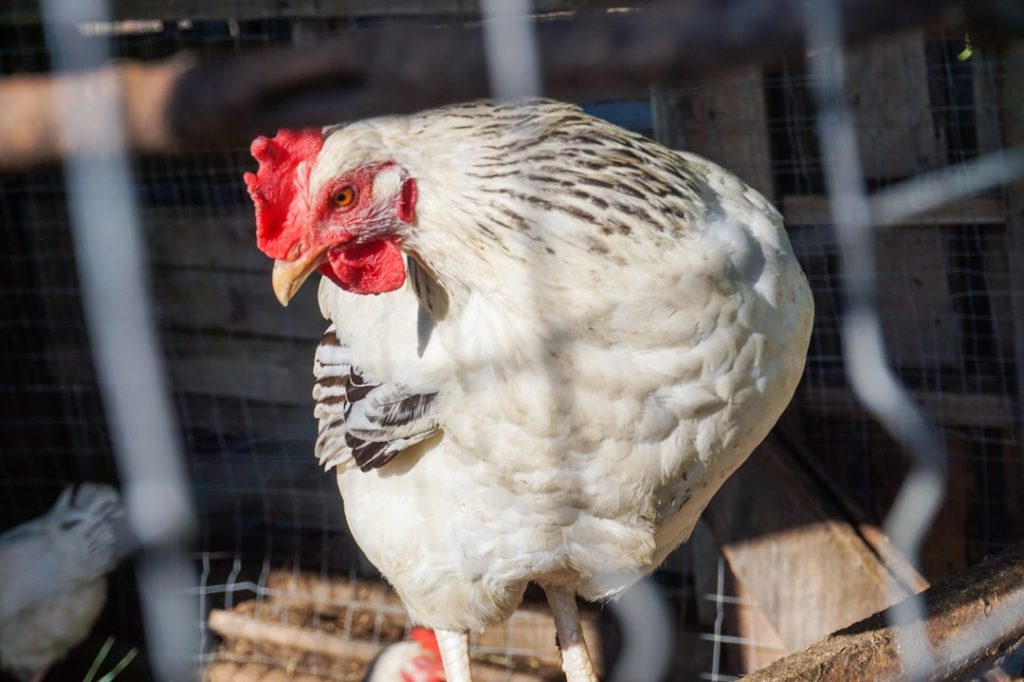Chickens are social creatures that thrive in flocks. They establish a hierarchical structure known as the pecking order, which includes dominant and submissive individuals. Understanding this social dynamic is essential for maintaining a harmonious coop environment.
Adequate space is crucial to allow chickens to establish their hierarchy without overcrowding, which can lead to aggression and stress. These birds are naturally curious and active, requiring both mental and physical stimulation. They enjoy exploring their surroundings, scratching the ground, and taking dust baths.
Providing opportunities for these natural behaviors promotes their well-being and reduces the likelihood of negative behaviors such as excessive pecking or feather picking. Chickens communicate through various vocalizations and body language. Soft clucking often indicates contentment, while loud squawking may signal alarm or distress.
Recognizing these communication cues helps identify potential issues within the flock, allowing for prompt intervention. By observing and understanding chicken behavior, caretakers can create a coop environment that meets the birds’ social and behavioral needs. This approach leads to healthier and happier chickens, promoting overall flock welfare.
Table of Contents
- 1 Providing adequate space and enrichment
- 2 Using barriers and deterrents
- 3 Implementing proper feeding and foraging techniques
- 4 Creating designated dust bathing areas
- 5 Regularly monitoring and adjusting the chicken coop
- 6 Seeking professional advice if necessary
- 7 FAQs
- 7.1 What are some reasons why chickens dig?
- 7.2 How can I prevent chickens from digging in my garden?
- 7.3 Are there any natural deterrents to keep chickens from digging?
- 7.4 What are some potential risks of chickens digging in certain areas?
- 7.5 How can I train my chickens to stop digging in certain areas?
Key Takeaways
- Chickens are social animals and exhibit complex behaviors such as pecking order and dust bathing.
- Providing adequate space and enrichment, such as perches and toys, is essential for the well-being of chickens.
- Using barriers and deterrents can help protect chickens from predators and prevent them from wandering into unsafe areas.
- Implementing proper feeding and foraging techniques, such as providing access to fresh grass and insects, can improve the health of chickens.
- Creating designated dust bathing areas with fine sand or dirt can help chickens maintain their hygiene and reduce stress.
- Regularly monitoring and adjusting the chicken coop, including temperature and ventilation, is important for the health and comfort of the chickens.
- Seeking professional advice, such as from a veterinarian or experienced poultry farmer, can be beneficial for addressing specific concerns or challenges with chicken care.
Providing adequate space and enrichment
Space Requirements
The general rule of thumb is to provide at least 2-3 square feet of space per chicken inside the coop, and 8-10 square feet per chicken in the outdoor run. This allows the chickens to establish their pecking order without feeling cramped or confined.
Enrichment for a Stimulating Environment
Providing enrichment such as perches, dust bathing areas, and hanging treats can keep the chickens mentally and physically stimulated, reducing the likelihood of boredom-related behaviors. Enrichment can also include providing objects for pecking and scratching, such as straw bales or hanging vegetables.
Promoting Positive Behaviors
This encourages natural foraging behaviors and keeps the chickens occupied and engaged. By providing adequate space and enrichment, you can create a stimulating environment that promotes positive behaviors and reduces stress within the flock.
Using barriers and deterrents

Predators can pose a significant threat to the safety of chickens, so it’s important to use barriers and deterrents to protect them. This can include installing fencing around the coop and outdoor run to prevent access from predators such as foxes, raccoons, and birds of prey. Additionally, using hardware cloth with small openings can prevent predators from reaching through and attacking the chickens.
It’s also important to secure the coop with locks and latches to prevent predators from gaining access. Deterrents such as motion-activated lights or sound devices can also be effective in deterring predators from approaching the coop. These devices can startle predators and discourage them from attempting to access the chickens.
By using barriers and deterrents, you can create a safe and secure environment for your chickens, reducing the risk of predation and ensuring their well-being.
Implementing proper feeding and foraging techniques
Proper feeding and foraging techniques are essential for maintaining the health and well-being of chickens. It’s important to provide a balanced diet that meets their nutritional needs, including a mix of grains, protein, vitamins, and minerals. Additionally, providing access to fresh water at all times is crucial for their hydration and overall health.
Foraging is a natural behavior for chickens, so allowing them access to outdoor areas where they can scratch and peck for insects, seeds, and plants is important for their mental and physical stimulation. Feeding techniques can also include using feeders that minimize waste and prevent contamination from droppings or dirt. This helps ensure that the chickens have access to clean and fresh food at all times.
By implementing proper feeding and foraging techniques, you can support the health and natural behaviors of your chickens, leading to happier and more contented birds.
Creating designated dust bathing areas
Dust bathing is a natural behavior for chickens that helps them maintain healthy skin and feathers. It also serves as a way for them to regulate body temperature and keep parasites at bay. Providing designated dust bathing areas within the coop or outdoor run encourages this natural behavior and helps keep the chickens clean and comfortable.
This can be achieved by creating a shallow area filled with fine sand or dusting powder where the chickens can scratch, roll, and flap their wings. By creating designated dust bathing areas, you can promote the natural behaviors of your chickens while also helping them maintain good hygiene. This can reduce stress and discomfort within the flock, leading to healthier and happier birds overall.
Regularly monitoring and adjusting the chicken coop

Coop Maintenance
Regular cleaning of the coop is essential to prevent the buildup of droppings and bacteria that can lead to health issues for the chickens. This includes removing soiled bedding, cleaning feeding and watering systems, and disinfecting all surfaces.
Coop Layout and Features
It’s also important to adjust the coop layout or features based on the behavior and needs of the chickens. By observing their behavior, you can identify areas that may need improvement, such as overcrowding or stress points. Making adjustments to the coop layout or adding enrichment activities can help alleviate stress and promote a healthy and happy flock.
Creating a Healthy Environment
By regularly monitoring and adjusting the chicken coop, you can create an environment that supports the well-being of your chickens and prevents potential issues from arising. This includes providing adequate space, ventilation, and enrichment activities to promote a healthy and stress-free flock.
Seeking professional advice if necessary
If you encounter challenges or issues with your chickens that you are unsure how to address, it’s important to seek professional advice. This can include consulting with a veterinarian who specializes in poultry health or seeking guidance from experienced poultry keepers. Professional advice can help you identify and address any health issues, behavioral concerns, or management challenges within your flock.
Additionally, joining local poultry groups or forums can provide valuable support and advice from experienced chicken keepers who have encountered similar challenges. By seeking professional advice when necessary, you can ensure that you are providing the best care for your chickens and addressing any issues in a timely and effective manner. In conclusion, understanding the behavior of chickens is essential for creating a coop environment that supports their well-being.
Providing adequate space and enrichment, using barriers and deterrents to protect against predators, implementing proper feeding and foraging techniques, creating designated dust bathing areas, regularly monitoring and adjusting the chicken coop, and seeking professional advice when necessary are all important aspects of responsible chicken keeping. By prioritizing the needs of your chickens and creating a stimulating and secure environment for them, you can promote their health and happiness while enjoying the rewards of keeping these fascinating animals.
If you’re looking for tips on how to keep chickens from digging, you might also be interested in learning about how long it takes for chicken eggs to hatch naturally. Check out this article for more information on the hatching process and what to expect when breeding chickens.
FAQs
What are some reasons why chickens dig?
Chickens dig for a variety of reasons, including foraging for food, creating dust baths, and seeking out cooler ground in hot weather.
How can I prevent chickens from digging in my garden?
To prevent chickens from digging in your garden, you can use physical barriers such as chicken wire or fencing, provide designated digging areas with loose soil or sand, and ensure that the chickens have plenty of space and enrichment to keep them occupied.
Are there any natural deterrents to keep chickens from digging?
Some natural deterrents to keep chickens from digging include placing rocks or large stones in areas where you don’t want them to dig, using citrus peels or other strong-smelling substances to discourage digging, and planting prickly or thorny plants in areas where chickens tend to dig.
What are some potential risks of chickens digging in certain areas?
Chickens digging in certain areas can pose risks such as damaging plants and landscaping, creating holes that can be hazardous to humans and other animals, and potentially exposing themselves to predators if they dig under fencing or other protective barriers.
How can I train my chickens to stop digging in certain areas?
You can train your chickens to stop digging in certain areas by providing alternative activities and enrichment, using positive reinforcement such as treats and praise when they avoid digging in prohibited areas, and consistently redirecting their behavior when they start to dig in unwanted areas.
Meet Walter, the feathered-friend fanatic of Florida! Nestled in the sunshine state, Walter struts through life with his feathered companions, clucking his way to happiness. With a coop that’s fancier than a five-star hotel, he’s the Don Juan of the chicken world. When he’s not teaching his hens to do the cha-cha, you’ll find him in a heated debate with his prized rooster, Sir Clucks-a-Lot. Walter’s poultry passion is no yolk; he’s the sunny-side-up guy you never knew you needed in your flock of friends!







